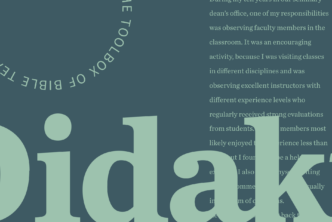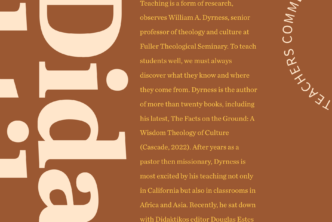Preparation, Prayers, and Cookies
Through intentional support, teaching while pastoring can benefit students as well as parishioners
by Stephen Witmer, Gordon-Conwell Theological Seminary
Adjunct teaching can be either dynamite or disaster. When I was a seminary student, the best exegesis class I took was taught by an adjunct professor who served as a full-time pastor. But so was the worst one. The best class made me yearn to study God’s word more deeply and shepherd God’s people more effectively. The worst just made me yearn for the class to end.
I’ve since reflected on what made the difference. It’s a pressing question for me, because now I’m the one behind the lectern (and the pulpit). I’m a full-time pastor in a small town in Massachusetts, and I teach New Testament exegesis at Gordon-Conwell Theological Seminary.
My favorite professor was remarkably well prepared for his lectures. The other professor was clearly stretched too thin between church work and teaching responsibilities. He didn’t prepare adequately for his lectures, and I had the feeling that his church was likely as ill-served through his adjunct teaching as were his students.
When I began adjunct teaching years later, it was clear to me that the full support of my church was necessary for success. My church leaders and congregation had to be behind my teaching and enthusiastic about allowing me the time to do it well. And this has happened. My church supports my teaching. They give me time to prepare lectures. They make cookies for my students. Many in the congregation choose one student in the class to pray for throughout the semester. They see my teaching as an investment in future Christian workers, a means of serving God’s kingdom. Consequently, I feel a synergy—rather than a disconnect—between pastoral ministry and teaching. And the students are amazed and encouraged (by both the cookies and the prayers).
My favorite professor’s pastoral vocation informed and improved his top-notch scholarship. I’ve come to see that my main calling to pastoral ministry greatly improves my secondary calling to seminary teaching. Though I do less teaching than I otherwise would, the teaching I do is better than it otherwise would be. I regularly share stories from pastoral ministry with my students, and reflect with them on how the passage we’re studying can be applied within the context of church ministry.
I love to exegete the Greek text of 1 Thessalonians 2 and then talk about my own love for the people in my church family. It’s rich to dig into the eschatology of 1 Thessalonians 4–5 and then reflect on how eschatology, properly understood, motivates a life of obedience and love among ordinary Christians. Most students preparing for a life of pastoral ministry long for serious exegesis to be brought together with serious application. An adjunct professor who serves as a full-time pastor has a unique opportunity to bring these pieces together into a compelling whole.
I recently attended commencement exercises at Gordon-Conwell. Watching the full-time faculty marching together in their regalia, I felt the loss of not being fully a member of that academic circle, composed of men and women I know, love, and respect. But I wouldn’t trade if I could. I love my church too much, and believe I can serve my students well this way.
At the graduation ceremony, I recognized several former students and exchanged smiles with them as they paraded past. As an adjunct faculty member, I can’t reach all, or even most, of the students at my seminary. But I can seek to profoundly shape some.

Originally published in Didaktikos: Journal of Theological Education (November 2017). Biblical studies and theological faculty can receive Didakitkos for free.
Visit DidaktikosJournal.com.






